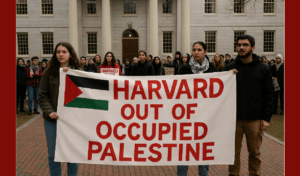BREAKING: Harvard Cracks Down on Palestine Solidarity Group – 8 Events Canceled in Major Free Speech Clash
Harvard College has placed the Palestine Solidarity Committee (PSC) on probation and banned it from holding public events until July, following a protest promoted by the group. The rally, held by the unrecognized organization Harvard Out of Occupied Palestine (HOOP), drew around 300 participants and allegedly violated campus rules on amplified sound and movement restrictions. Though PSC did not officially organize the event, Harvard said their association with HOOP broke university policies.
As a result, eight upcoming PSC events, including cultural programs and an art exhibit, were canceled. PSC has pushed back, claiming Harvard failed to provide clear evidence of wrongdoing and is unfairly targeting their activism. Tensions between Harvard and the PSC have escalated over the past year, with previous suspensions over similar rule violations. The decision also follows increased political pressure from the Trump administration and a federal review of Harvard’s funding. PSC accuses the university of using these pressures as justification to suppress pro-Palestine advocacy on campus.

BREAKING: Harvard Cracks Down on Palestine Solidarity Group – 8 Events Canceled in Major Free Speech Clash
Harvard College has placed the Harvard Undergraduate Palestine Solidarity Committee (PSC) on probation, prohibiting the group from hosting public events until July. This decision follows a rally held on Tuesday by Harvard Out of Occupied Palestine (HOOP), an unofficial student group not recognized by the university. While the PSC helped promote the protest on social media, it insists it did not organize the event. Despite this, Harvard canceled eight PSC-sponsored programs scheduled for April, including cultural workshops and an art exhibition.
The protest, held near University Hall in Harvard Yard, drew roughly 300 participants. University officials stated the demonstration violated campus policies in three ways: using amplified sound without approval, blocking access to campus buildings, and collaborating with HOOP—a group lacking official recognition. Harvard’s rules bar registered student organizations like the PSC from partnering with unapproved groups.
The PSC disputes Harvard’s claims, arguing the university provided vague explanations for the penalties and failed to clarify how the committee directly organized the rally. The group maintains it only shared details about the event online, as it has done in the past for other HOOP protests.
Ongoing Tensions and Previous Penalties
This incident is the latest in a series of clashes between Harvard and the PSC. The committee was previously placed on probation in March 2024 and briefly suspended in April 2024 for similar alleged violations before being reinstated in September. The latest disciplinary action follows a petition signed by over 3,500 people—including more than 200 Harvard students, faculty, and alumni—calling for the PSC’s permanent disbandment over accusations of antisemitism.
The controversy has also drawn political attention. Former President Donald Trump’s administration recently warned Harvard that it risks losing federal funding if it fails to address antisemitism on campus. Separately, three federal agencies have launched a review into more than $8 billion in grants awarded to the university. Harvard President Alan Garber swiftly pledged full cooperation with the investigation, which was announced just hours before the PSC’s probation.
PSC Alleges Unfair Targeting
The PSC claims Harvard’s actions are disproportionate and politically motivated, arguing that the university is overstepping its own policies under pressure from external critics. The group asserts it has consistently followed campus guidelines and that sharing information about protests—a common practice among student organizations—should not warrant punishment.
Harvard, however, defends its decision, emphasizing its commitment to free expression while stressing that all demonstrations must comply with campus regulations regarding timing, location, and conduct. A university spokesperson noted that policies on sound equipment, building access, and collaboration with unofficial groups apply equally to all student organizations.
Broader Implications
The situation highlights growing tensions over campus speech and activism related to the Israeli-Palestinian conflict. Critics of the PSC accuse it of fostering a hostile environment through protests and rhetoric they describe as antisemitic. Meanwhile, supporters argue the committee is being unfairly silenced for advocating Palestinian rights and criticizing Israeli policies.
The federal review of Harvard’s funding adds another layer of complexity. While the investigation is not directly linked to the PSC, the timing has fueled speculation about whether political pressure influenced the university’s disciplinary actions. Free speech advocates have raised concerns about the chilling effect such measures could have on student activism nationwide.
Looking Ahead
As the PSC navigates its probation, the committee plans to challenge the sanctions through the university’s appeals process. Its members vow to continue raising awareness about Palestinian issues, albeit within Harvard’s restrictions. Meanwhile, the university faces scrutiny over its handling of dissent, balancing free speech principles with demands to address discrimination claims.
The outcome of this dispute could set a precedent for how academic institutions manage politically charged activism, federal oversight, and the boundaries of student expression in increasingly polarized times. For now, Harvard’s community remains divided, with debates over justice, safety, and academic freedom far from resolved.
You must be logged in to post a comment.